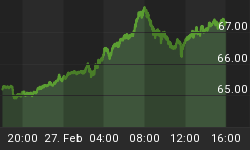The media insists on characterizing statements about dependency on government handouts as controversial, but in truth such statements are absolutely correct. It's not that nearly half of Americans are dependent on government; it's actually more than half. If one includes not just ![]() people on food stamps and welfare, but also seniors on Medicare, Social Security and people employed by the government directly, the number is more like 165 million out of 308 million, which is 53%.
people on food stamps and welfare, but also seniors on Medicare, Social Security and people employed by the government directly, the number is more like 165 million out of 308 million, which is 53%.
Some argue that Social Security and Medicare benefits are a right because people pay into these programs their whole lives, or that we need a government safety net in place for people who fall on hard times. However, this all becomes a moot point when the funds people depend on become worthless due to government default or rampant inflation.
This is less an issue of dignity or dependence on government, and more about the deceitfulness of government promises.
The Fed recently announced that it plans to keep interest rates near zero and keep buying near worthless assets from banks indefinitely. This enables Congress to spend without having to take deficits or the debt seriously and there is every indication they intend to spend with impunity until the system collapses. There are no brakes on the runaway train. The federal debt ceiling law does nothing to limit spending. The ceiling will have to be raised yet again perhaps before the year is out. What is happening in Greece with austerity measures and riots in the street will happen here within a decade according to some realistic estimates if we do not find some way to fiscally restrain our government.
There is little point in a debate about being entitled to healthcare or food or shelter from fellow taxpayers if the whole system has collapsed. And, with the way our politicians have taken over and mismanaged vast amounts of resources, collapse seems almost unavoidable. Yet the number of Americans who have significant dependency on government is dangerously high, and I honestly fear for them.
Worse, corporate welfare is also at an all time high with no signs of diminishing. Though it is hard to quantify, ![]() Tad Dehaven at Cato has estimated that the government spends nearly twice as much on corporate welfare than on social welfare. Both parties are equally guilty. More and more, the business sector is learning to rely on taxpayer largesse in one form or another. They used to be solely concerned with providing a better product to the consumer at a better price. Now, success on Wall Street depends entirely too much on having the best lobbyists on K Street. If one includes the employees of "private" businesses who depend on government contracts, grants or bailouts, there are even more people dependent on government in some way.
Tad Dehaven at Cato has estimated that the government spends nearly twice as much on corporate welfare than on social welfare. Both parties are equally guilty. More and more, the business sector is learning to rely on taxpayer largesse in one form or another. They used to be solely concerned with providing a better product to the consumer at a better price. Now, success on Wall Street depends entirely too much on having the best lobbyists on K Street. If one includes the employees of "private" businesses who depend on government contracts, grants or bailouts, there are even more people dependent on government in some way.
Government does not create resources when it taxes people and prints money; it merely redistributes the wealth, while supporting a massive, wasteful bureaucracy along the way. Government is a giant, blood-sucking parasite on our otherwise healthy economy. For too long we have entrusted too much economic power and influence to irresponsible politicians in Washington. It's the chaos that ensues after they run the system into the ground that will be so painful for so many people. But realigning our economy with the free market and away from government mandates and handouts must happen in order for it to thrive again.
The answer is not to keep asking government to do more. The answer is to extricate our economy and ourselves from the grasp of Washington DC as much as possible now, before our dependency becomes our downfall.















